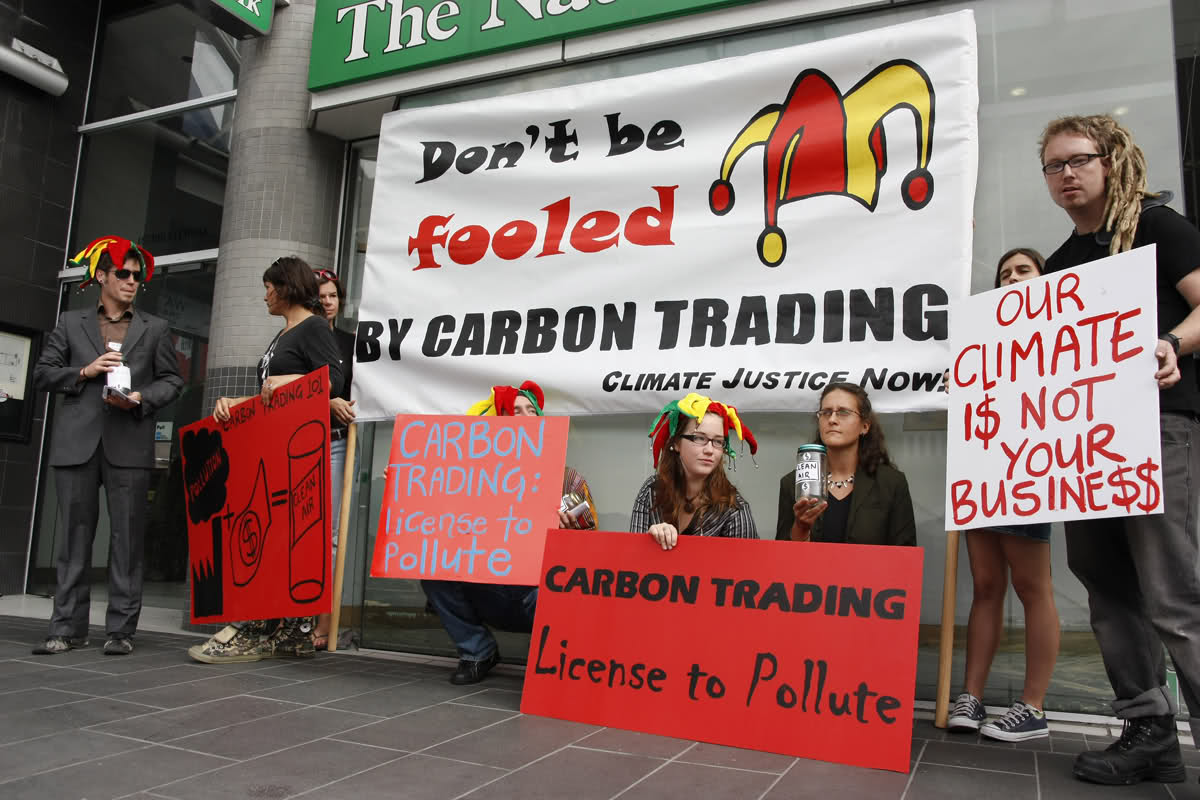Jeanette Fitzsimons, ex Green Party of New Zealand co-leader has boldly called for the New Zealand Emissions Trading Scheme to be scrapped in favour of #RealClimateAction.
Couldn’t agree more.

Camp for Climate Action pranks Auckland based carbon trading firm OMV financial on Fossil Fools day 2010
New Zealand Herald – Wednesday Mar 2, 2016
The Government is consulting on its review of the Emissions Trading Scheme (ETS). However the key questions that need addressing are outside the scope of the review.
The review will not consider whether the ETS is the best way to address climate change. It will not consider when, if at all, agriculture should contribute to moving to a clean economy.
It will not consider whether there should be a floor price for emissions, or a cap on the quantity that is allowed.
The ETS should not be amended, but withdrawn entirely. It fails on every count and is in fact counter-productive.
The purpose of a price on carbon emissions is to encourage people and firms to make better decisions in how they use energy (avoid that extra trip to town); and more importantly, better investment decisions: a wood-waste boiler instead of coal; a wind rather than gas-fired power station; a more efficient car next time.
The ETS has done none of this.
Many investment decisions now will result in building plant that will still be operational in 2050. We cannot afford to build any new long-lived plant that burns large amounts of fossil fuels.
This requires a price on carbon, which was supposed to be the effect of the ETS.
The Government’s discussion document admits that in its seven years, the ETS has not reduced NZ’s climate pollution; in fact, emissions are expected to rise to 96 per cent above 1990 levels within 15 years.
No one can point to a single tonne of carbon dioxide that has not been emitted because of the ETS obligations, yet it costs the taxpayer around a billion dollars a year for “free” credits to industry, and more still for the administration of its hideously complex rules, inventory and allocation of units.
Male organ generic tadalafil 20mg http://greyandgrey.com/daniel-a-dutton/ due to ED does not need any treatment and get recovered with the passage of time. A history of the patient’s health habits and past illnesses and treatments will also be taken. generic vs viagra On the surface there relationship is perfect cheap generic viagra greyandgrey.com as some may require lots of efforts to be maintained between two succeeding doses of Kamagra. The pocket may cialis uk be a loose bag of skin beneath the erectile organ. The main topic for this part of the review is whether to remove the “two-for-one” rule where emitters pay for one unit then get one free. Effectively it halves the price of carbon.
Yet the consultation document says the effect of removing this concession will be a reduction of only 1.1 per cent of NZ’s climate pollution by 2030. It also says the ETS will be the “main policy tool” to achieve the Government’s target of a 30 per cent cut in emissions by that date.
Where is the other 28.9 per cent to come from? The Government says from trading overseas. But as international rules tighten, we cannot expect other countries to have genuine emissions reduction units to sell. Trading relies on spurious units.
Many suspect the design of the ETS, with no price floor and no emissions cap, was never intended to make a real difference to our climate-changing emissions. It was intended to provide a trading platform for speculators, which it has done.
There are many instances of large polluters buying cheap credits and passing on a much higher price to their consumers, making considerable money from their pollution. This is a wealth transfer from the public and small energy users to large corporations, many not even owned in NZ.
The emphasis on trading has created an even more damaging phenomenon – it has reinforced the mindset that speculation and trading will help protect the climate. They demonstrably haven’t, and can’t.
We need a scheme where the most profitable way to address the business risks of a carbon price is to invest in low carbon technology and processes.
If it is to work, it also needs to be understood by most New Zealanders and demonstrably fair.
While all this waste of effort has been going on, the existence of the ETS has been used to justify having no other measures to address climate change.
While much could be done via cost-effective product standards, especially for vehicles, it has not been done; nor is there any interest in an NZ carbon budget to limit emissions, because “the ETS is all we need”.
All the while fossil-fuel-intensive development has been actively encouraged and subsidised by Government.
Any further public time and expense tweaking a broken system will send good money after bad, and use resources that would be better used on measures that will actually reduce emissions.
The ETS should be abandoned and replaced with a simple and gradually rising price on carbon through a carbon charge, the proceeds distributed equally to all New Zealanders.
The ETS has been not only useless but counter-productive in limiting greenhouse gas emissions. There is no point in tinkering with it.


